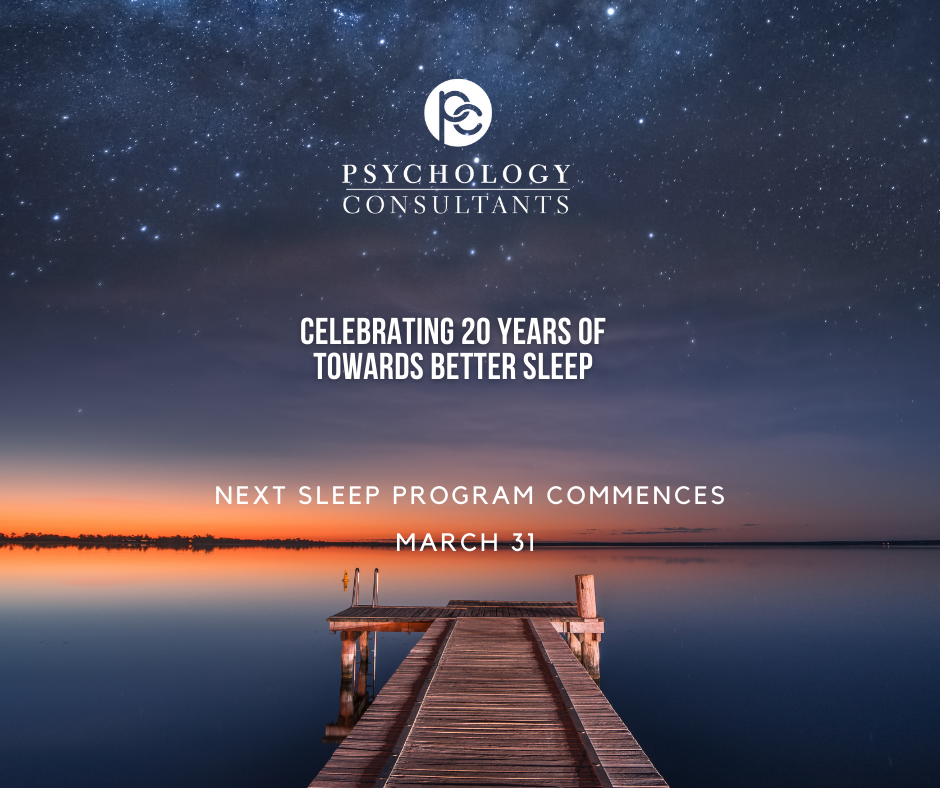“The biggest thing that most people worry about when they are not sleeping is not world affairs but simply about not sleeping!” Kathryn Smith
There is a lot be said for sleep. A close second to food and water, we simply cannot survive without it. As one of the pillars of good health, it stands to reason that getting quality sleep is a priority for clinicians and their patients alike. Back in 2002, two forward thinking health professionals, Kathryn Smith and Dr Curt Gray, had a brain wave and out of it emerged Towards Better Sleep, a group insomnia programme that this year celebrates 20 years of helping people achieve better sleep. “The Towards Better Sleep program emerged from discussions Curt and I had after we worked together at the Princess Alexandra Hospital. We had been doing a clinic in the Sleep Medicine Services seeing a lot of insomnia patients, and from this we began discussing how effective it would be to deliver the strategies in a group setting. In our time outside of our public work, we commenced work on the TBS program which evolved over a year. We then rolled out the first group at New Farm Clinic who generously provided access to one of their group rooms. We later modified TBS and delivered a similar group for the public sector, for a while,” comments Kathryn Smith.

Kathryn Smith & Dr Curt Gray
Over the past two decades there have been many advancements in medicine and changes to the way health professionals practice, however when it comes to one of the most natural bodily functions-that is sleep, treatment remains constant. “Interestingly, not too much has changed as far as management for insomnia goes. Cognitive Behavioural Therapy or CBTi (as known in the sleep circles) remains the gold standard approach to insomnia management. There have been some different theories emerging particularly around the role of blue/green light but these theories have more recently been contested. Mindfulness has also emerged as a complementary technique since the beginning of the program, and we’re starting to see some new medications with potential for less side-effects and risks for those who may require them,” remarks Dr Curt Gray.
The cognitive behavioural therapy-based program uses evidenced based techniques that focus on sleep education, correcting faulty thinking and relaxation strategies. Held in four one-hour sessions at Psychology Consultants Morningside, the group setting offers clients the opportunity to share experiences whilst reducing the overall cost of therapy.
“I think I can confidently say that all different people have attended. All ages, all genders, and all professions. I do think that people are more willing now to ask for help and not be ashamed in seeking this,” said Kathryn Smith.
“One memorable patient was an older lady who couldn’t work out why she didn’t sleep despite practically living her life in bed. For example, she would work, trade stocks and watch TV amongst other activities. She even had a fridge in her room! Her body and mind became so confused that instead of conditioning herself to associate bed with sleep, she associated bed with everything but sleep. She was such a delight in the group and yes, she did clear out her bedroom and stay out of bed for those activities.”
Despite the treatment approach to insomnia remaining constant over the years, technology, and the role it plays in our lives has changed and unsurprisingly it is affecting our sleep. Kathryn agrees that technology has played a role in promoting insomnia, particularly in the way we are now always accessible. “I find patients feel more accountable and have blurred boundaries between work, social life and self-care including sleep. This isn’t always a good thing for insomniacs!” In saying that, Kathryn reflects that not that much has changed in terms of what impacts sleep. “Typically, people will find something to worry about or may simply fall into bad habits that maintain the problem. The biggest thing that most people worry about when they are not sleeping is not world affairs but simply about not sleeping!”
Of course, it wouldn’t be a 20-year reflection without mentioning the pandemic and the program was not unscathed. COVID impacted the delivery of Towards Better Sleep and in 2020, only one program was delivered with 2021 seeing a reluctance in attendance.
“We are now picking up again, despite COVID being around but we know that anxiety and probable sleepless nights are on the rise,” comments Dr Curt Gray.
Prior to COVID, Kathryn and Curt had been planning to take Towards Better Sleep online, and the pandemic has been a good catalyst for the shift to online therapy. The facilitators hope that in doing this, they can make the program more accessible to those who don’t have the opportunity to attend in person, expanding the reach well beyond Brisbane. The next program commences on 31st March however only a few places in this group remain. For more information on the program visit https://psychologyconsultants.com.au/services/group-programs/ or to register email [email protected]
